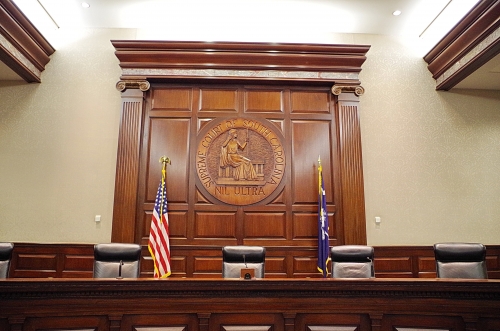Release: SC Supreme Court Finds Education Scholarships Unconstitutional
FOR IMMEDIATE RELEASE
SC Supreme Court Finds Education Scholarships Unconstitutional
2,880 students see their scholarships cancelled weeks into the school year
COLUMBIA — In a ruling handed down today, the South Carolina Supreme Court found in favor of the plaintiffs in Eidson et al. v. SC Department of Education et al. The 3-2 decision, written by Associate Justice Hill declared the Education Scholarship Trust Fund (ESTF) program signed into law on May 5, 2023, to be violative of the South Carolina Constitution as a “direct” benefit to independent schools and enjoined the SC Department of Education from disbursing ESTF scholarships for the 2024-25 school year.
The practical impact of the decision is that 2,880 low-and moderate-income children who were approved for ESTF scholarships will not be permitted to exercise their right to a choice in education, a choice already enjoyed by children from wealthier families. With an ESTF, those K-12 students would have received a state scholarship through a portal, allowing his or her parents to choose from a wide range of educational services, including independent (private) schools and public schools. The first round of ESTF payments ($1,500) have already been loaded into each student’s account were available for use o cover educational expenses for like school supplies, tuition, tutoring, and therapies. Now, it is unclear what will happen to those students and families cut off from their promised scholarships weeks into the school year.
Specifically, the high court found the ESTF program to be violative of Article XI, Section 4 of the South Carolina Constitution (1895) that bans direct state funding for private schools. (The Constitution was amended in 1972 to allow indirect but not direct state support for students in independent schools. South Carolina law already provides indirect aid programs exclusively enjoyed by students attending private colleges and pre-kindergarten.)
The Education Scholarship Trust Fund (ESTF) program is a South Carolina scholarship program for K-12 students modeled on legislation sweeping the country under the more generic name “Education Scholarship Accounts” or “ESAs.” ESAs were pioneered in the State of Arizona in 2011 as a funding mechanism that would allow parents a wide range of options in education providers so that each child could receive a customized education. As of this writing 17 states have passed ESA programs, many of which are “universal,” meaning there are no requirements for receiving a scholarship other than being a K-12-aged resident of the state. The current South Carolina ESTF program has an income ceiling and a previous public school attendance requirement. For the 2024-25 school year, the student’s household income may not exceed 200% of the federal poverty line (about $62,000 for a family of four) and he or she must have attended a South Carolina public school in the previous year to qualify.
Palmetto Promise Institute President Wendy Damron found the ruling baffling. “Today, a court overturned a duly passed piece of legislation on the basis of an indefensible misreading of the words of our State Constitution. Prekindergarten students and college students enjoy state programs that allow them to attend private and religious schools. How is a program for K-12 students any different?” Damron said. “It is unconscionable that the Supreme Court would rip away these scholarships from children and families counting on the funds for their education this year.” Palmetto Promise Institute introduced the ESA concept to the state nearly a decade ago.
Damron encouraged State Superintendent Ellen Weaver and State Treasurer Curtis Loftis to appeal. “The United States Supreme Court has spoken at least three times on the unconstitutionality of Blaine Amendments in state constitutions. A decision on the basis of South Carolina’s Blaine Amendment flies in the face of these decisions. I hope Ms. Weaver and Mr. Loftis will appeal so that parents will no longer be forced to watch their child fail to thrive in a school that is a bad fit.”
Palmetto Promise Institute introduced the Education Scholarship Account (ESA) concept to South Carolina in 2015 and has long championed the flexibility it offers parents as they seek ways to customize an education for their children. S.39/Act 8 (2023) includes 15 different categories of expenses from which parents may choose including tutoring, therapy, and tuition—recognizing that each child is unique and requires education services tailored to those needs.
###
Palmetto Promise Institute (PPI) is an independent, nonpartisan, nonprofit, 501(c)(3) educational organization. Palmetto Promise conducts public policy research dedicated to advancing a free and flourishing South Carolina, where every individual has the opportunity to reach his or her full potential.
Contact: Oran Smith
oran@palmettopromise.org
(803) 708-0673





